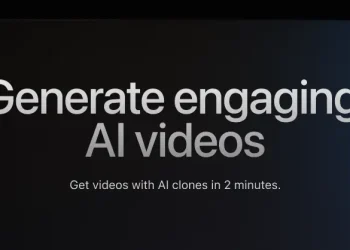Did you know the AI in social media market is set to hit about $2.2 billion by 2023? This shows how big a role AI plays in making social media better and changing how companies market themselves. With billions of users on different platforms, AI is key to making online chats better and making content more efficient.
Tools like Pixlr and Canva use advanced machine learning to make content that grabs attention. AI tools like Brandwatch’s Iris and ChatGPT help create content that really speaks to people. This makes making content faster and smarter, giving brands a way to connect with their audience in a deep way.
AI can understand what people like and how they interact with content. This changes how companies talk to their customers, making their interactions more meaningful. It’s all about making sure brands connect with people in a way that feels real and personal.
Key Takeaways
- AI tools can create content in minutes, enhancing efficiency and effectiveness.
- Popular AI technologies include Natural Language Processing and Machine Learning, vital for analyzing user behavior.
- AI-driven chatbots facilitate real-time customer interactions on social media platforms.
- Predictive analytics help identify potential customers, sharpening targeted content strategies.
- AI tools like Brandwatch and Frase generate tailored ideas for social media posts.
- Sentiment analysis provides valuable insights into audience perceptions of brands.
Understanding AI and Its Role in Social Media
AI has changed social media, making it better for users and more engaging. Now, social media uses advanced AI to improve how we interact and what we see. This makes AI key to their success.
The Evolution of AI Technologies
At first, AI in social media was simple, just doing basic tasks. But now, thanks to fast progress, AI can do amazing things like predict trends and make content better. In 2021, there were about 4.48 billion people using social media, spending 145 minutes a day on it. This data helps AI understand what people like, making their experience better.
Current Trends in Social Media Engagement
AI is now crucial for how brands talk to their fans. Facebook and Instagram use AI to show users content they’ll like, making them more engaged. Tools like Sprout Social and Hootsuite use AI to help marketers see how well they’re doing and spot trends.
| Platform | AI Applications | Key Benefits |
|---|---|---|
| Content recommendations, ad targeting | Enhanced user experience, improved ROI | |
| Image recognition, personalized content delivery | Higher engagement rates, brand loyalty | |
| TikTok | Content virality prediction | Optimized content strategy, increased reach |
| Sentiment analysis | Informed decision-making, real-time audience insights | |
| Job recommendations | Better user matching, increased engagement |
AI is making social media more engaging and helping brands market smarter. By using AI, brands can understand what people want, helping them stand out in a crowded market.
AI in Social Media Content: Transforming User Engagement
AI has changed how social media connects with users. It makes content more personal and gives insights into what people like. This helps brands talk to their audience in a way that feels right, making content that fits their likes and actions.
Enhancing Personalization Through AI Algorithms
AI algorithms are key to making social media more personal. They look at how users act and group them by things like age, where they live, and what they’re interested in. This lets brands send out content that’s just for them, making people more likely to click and engage.
For example, AI can make posts that are just right for each user, based on what they like. This means people see content that really speaks to them.
Leveraging Predictive Analytics for Audience Insights
Predictive analytics is vital for knowing what users will do next. AI helps brands figure out the best times to post, what kind of content will hit the mark, and how to advertise best. This helps marketers make plans that really work.
Companies like Kameleoon and Audiense use AI to analyze how people interact with ads. This helps brands make their ads more effective.
| Feature | AI Implementation | Benefit |
|---|---|---|
| Content Segmentation | Audience analysis based on interests and behavior | Increased relevance of content delivery |
| Timing Optimization | Analysis of peak engagement times | Maximized visibility and interaction |
| Advertising Strategies | Analysis of customer data for targeting ads | Improved marketing effectiveness |
The Power of Natural Language Processing in Social Media
Natural language processing (NLP) is changing social media. It helps brands make content that grabs attention and feels right for their audience. By using NLP, companies can make their content better and understand what people think.
Application of NLP in Content Creation
NLP is key to making content creation better. AI tools use natural language processing to create messages that fit the brand’s voice. This lets marketers make content that speaks to their audience. It also makes making content faster and keeps the message consistent.
Brands can use data from social listening and customer feedback to make posts that matter. Recent reports show that 96% of leaders see AI and machine learning as big game-changers. This shows how NLP is becoming a big part of making brand stories and engaging with social media users.
Sentiment Analysis and Its Importance for Brand Messaging
Sentiment analysis is crucial for understanding what customers think. With NLP, companies can see how people feel about their products and services. This helps them know if customers are happy and deal with any issues fast.
In today’s market, knowing what people think is key to a brand’s success. Tools like Sprout Social use NLP to analyze feelings, giving brands deep insights. These insights help shape marketing, find the right brand position, and keep a good reputation. This leads to messaging that meets what consumers want and expect.
| Feature | NLP Applications |
|---|---|
| Content Generation | Automated content creation and optimization |
| Sentiment Analysis | Measuring audience emotions and opinions |
| Trend Identification | Tracking popular topics and discussions |
| Audience Segmentation | Categorizing users by demographics for targeted messaging |
| Named Entity Recognition | Identifying influencers and tracking brand mentions |
As natural language processing becomes more common in social media, brands can reach more people and build strong connections. For more on using AI to boost engagement, check out AI-powered content recommendations.
Automation and AI-Driven Content Creation
Automation is changing the game in social media marketing. AI tools are making brands more efficient and productive. They handle many content production tasks, letting marketers focus on creative work that connects with their audience.
AI Tools for Streamlined Content Production
Platforms like Canva and GPT-4 are changing how we make content. They help create visuals and text quickly. This makes high-quality content cheaper and available to more people.
Tools like Copy.ai and Jasper.ai cut down writing time. They help brands make more content without spending too much time. AI also looks at data to find trending topics and what people like. This helps come up with new content ideas that get more engagement.
AI technologies also deal with important issues like privacy and bias. Mixing human creativity with AI leads to new and innovative content.
Brands that focus on fresh, personalized content do well. Tools powered by AI help spread the brand’s message further. They also strengthen the bond with the audience, building loyalty and engagement online.
The Advantages of Social Media Monitoring with AI
In today’s fast-paced digital world, companies can greatly benefit from using AI in social media monitoring. AI helps brands quickly react to customer interactions. This ensures they can make strategic changes as needed. By keeping an eye on social media, businesses can spot trends early and tackle issues before they get worse.
Real-Time Analytics and Performance Tracking
Real-time analytics gives brands instant insights from social media. This is key for understanding how well they’re doing. With AI insights, companies can see which content works best with their audience. Tools with advanced filters let users focus on specific data, like keywords or hashtags, making it easier to track campaigns.
Managing Brand Reputation with AI Insights
Managing a brand’s reputation is a big part of social media monitoring. AI helps spot negative mentions and address customer concerns fast. This quick action helps prevent crises and builds loyalty by showing customers they’re heard. By using AI to track how people see their brand, companies can make their messages more effective.
| Benefits | Description |
|---|---|
| Real-Time Insights | Provides immediate information about customer conversations and market trends. |
| Improved Customer Engagement | Enhances interaction with customers through prompt responses to inquiries. |
| Crisis Management | Identifies negative sentiment quickly, helping to mitigate potential damage. |
| Competitor Analysis | Monitors competitor activities, offering insights into their strategies and performance. |
For a deeper understanding of how AI is enhancing content creation and management, visit this resource.
AI-Powered Content Moderation for Quality Control
AI technology is key in content moderation, especially in 2023. Social media platforms deal with a huge amount of content from users. Keeping content safe and of good quality is vital. AI uses machine learning and Natural Language Processing (NLP) to spot and block harmful stuff, making online places safer.
AI helps filter content in real-time, cutting down on the need for manual checks. It can quickly catch things like fake news, hate speech, bullying, and explicit images. This is crucial because social media updates fast, needing a strong way to keep standards up.
Platforms like Facebook, YouTube, and Instagram use AI to keep content in check. These algorithms help avoid human bias in moderation, making decisions more consistent. This builds trust with users and makes their experience better by managing content well.

AI also saves money for social media companies. It means fewer people are needed to check content, which saves a lot of money. It also keeps human moderators away from harmful content, protecting their mental health.
But, AI moderation has its problems too. Issues like bias in algorithms and privacy worries need to be looked at closely. Finding the right mix of AI and human moderators is key for the best results. This mix helps make moderation better and fixes issues with automated systems.
| Benefits of AI-Powered Content Moderation | Challenges |
|---|---|
| Efficient handling of large volumes of content | Algorithmic bias |
| Consistency in moderation outcomes | Privacy concerns |
| Cost-effective solutions for platforms | Risk of false positives and negatives |
| Improved user experience and trust | Need for ethical guidelines |
The Impact of Conversational AI on User Interaction
Conversational AI makes social media more engaging for users. Chatbots offer quick help, making customer support better. This leads to happier customers and more loyalty.
Chatbots and Real-Time Customer Support
Chatbots are key in providing excellent customer support. They handle many questions at once, freeing up human agents for tough issues. This makes talking to brands smoother and builds a stronger bond with users. The main benefits are:
- Instant Responses: Users get quick answers to their questions.
- 24/7 Availability: Help is always there.
- Increased Efficiency: Chatbots can deal with lots of questions at once.
- Cost-Effective: It cuts down on the need for many human support staff.
The AI in social media market is expected to hit $2.2 billion by 2023, growing at a 28.3% annual rate. Facebook Messenger and Twitter use chatbots to boost customer service and engagement. Twitter also uses conversational AI to understand feelings and spot trends, helping brands match their content with what people are talking about.
Advances in conversational AI are changing how brands talk to their audience. By using these tools, companies can create a more interactive space. This leads to happier users and stronger brand loyalty.
| Feature | Benefit |
|---|---|
| Instant Feedback | Makes users happier and cuts down on waiting. |
| High Availability | Support is there when users need it. |
| Scalability | Handles lots of questions without a problem. |
| Data Collection | Collects insights from chats to improve strategies. |
Predictive Analytics: Shaping Content Strategy
Predictive analytics is key in today’s content strategy for brands. It helps spot new trends and understand what consumers want. By using lots of data, it makes digital ads better and matches content with what different people like.
Identifying Trends and Consumer Behavior
Brands use predictive analytics to see what’s popular on social media. They look at past data to see what content works best. This helps them make campaigns that get more people involved and engaged.
- Data mining finds out what makes people interact more.
- Machine learning gets better at predicting what people will do by learning from past actions.
- Social media sites become places where data shows what people like and prefer.
Enhancing the Effectiveness of Digital Advertising
AI tools help businesses make their ads better by sending the right messages at the best times. These tools make ads more personal, which grabs people’s attention and builds loyalty to a brand.
| Benefit | Description |
|---|---|
| Improved Audience Targeting | Predictive analytics finds the right groups of people, making messages more relevant. |
| Data-Driven Content Strategy | It uses insights to make smart choices for creating content and marketing. |
| Enhanced Engagement | Customized content gets more people to interact and engage more. |

Future Applications of AI in Social Media Marketing
The future of AI in social media marketing looks bright. New technologies like augmented reality and advanced machine learning will change how brands talk to customers. These changes will make marketing more effective for businesses.
Emerging Technologies and Their Potential Impact
AI is already making a big difference in marketing. Now, 25% of business data comes from AI machines. This shows how important AI is in making content.
AI tools can make over 1,500 valid documents every second. This boosts efficiency in making content. Companies use AI chatbots on social media to talk to customers. These bots make customers happier and help with quick market trend predictions.
Here’s a look at how AI can change social media marketing:
| AI Application | Description |
|---|---|
| Predictive Analytics | Helps in identifying market trends, allowing brands to tailor their strategies accordingly. |
| Content Personalization | Generates tailored content based on individual user data, enhancing engagement. |
| Chatbots | Provides real-time customer support, significantly improving user experience. |
| Ad Optimization | Optimizes marketing spend and channel effectiveness through precise audience segmentation. |
| Content Generation | Facilitates the creation of diverse content types quickly, from articles to visuals. |
| Security Measures | Detects and mitigates risks associated with social media interactions. |
As AI gets better, companies using these new tools will likely do better in marketing. AI will help protect brands, increase reach, and improve returns on investment in social media marketing.
Conclusion
AI is changing how we interact with social media and shaping new marketing strategies. The market for AI in social media is expected to grow from USD 1.64 billion in 2023 to USD 5.66 billion by 2028. This shows that brands using AI will have a big advantage.
AI makes content more personal, which has boosted user engagement by 23%. This has made customers much happier. AI tools like chatbots also cut down response times by 50%, making things more efficient for users.
Businesses that use AI to handle reviews get 1.7 times more trust from customers. Using AI in engagement strategies is now key. AI’s precise targeting in ads will keep raising conversion rates by 40%, proving its value in digital marketing.
As AI grows in social media, with a 25% annual growth rate, it’s vital for companies to think about ethics and fair data training. This approach helps them connect better with the 4.8 billion users worldwide. Adapting to these new technologies is crucial for making social media efforts more effective.
FAQ
How does AI enhance user engagement on social media?
AI boosts user engagement by making content more personal. It looks at what users like and delivers content that matches their interests. This leads to more clicks and interactions. Predictive analytics also helps predict trends, so marketers can send out content at the best time.
What is the role of Natural Language Processing (NLP) in social media?
NLP lets machines understand and create human language. It’s used in making content and analyzing feelings in posts. This helps marketers create engaging content that fits the brand and understand what customers think. It makes messaging more effective.
How can brands use AI for content moderation?
AI helps by automatically finding and removing bad content. This keeps social media safe and trustworthy. It makes users feel more secure and happy with their online experience.
What are some benefits of using chatbots in social media marketing?
Chatbots offer quick help to users, making customer support better. They can talk to many people at once, making users happier and more engaged. This lets human agents focus on harder issues.
How do AI-driven analytics influence social media strategies?
AI analytics track how well content is doing in real-time. This helps brands see what works best. They can then change their strategies to keep improving engagement and manage their brand better.
What advancements are expected in the future of AI in social media?
The future looks bright with new tech like augmented reality (AR) and better machine learning. Early adopters will likely get ahead in marketing.
Why is automation important in content creation for social media?
Automation makes making content faster and easier. It lets brands create posts quickly for many platforms. This saves time for marketers to focus on creative ideas, improving their campaigns.
How does predictive analytics shape content strategy?
Predictive analytics spots new trends and what consumers like. This helps brands make content that hits the mark. It’s key for making ads that work and targeting them well.




